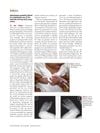 January 2018 in “Surgical and Cosmetic Dermatology”
January 2018 in “Surgical and Cosmetic Dermatology” Finasteride and dutasteride are effective for male hair loss and enlarged prostate but may cause reversible sexual side effects.
 April 2019 in “Actas Dermo-Sifiliográficas”
April 2019 in “Actas Dermo-Sifiliográficas” The conclusion is that having both Frontal Fibrosing Alopecia and Discoid Lupus Erythematosus may suggest a shared immune response in certain people, and a mix of antimalarial drugs and 5-alfa-reductase inhibitors is recommended for treatment.
 December 2022 in “Journal of applied biological chemistry”
December 2022 in “Journal of applied biological chemistry” Betula platyphylla extract, particularly the H3-2 fraction, may help treat hair loss by promoting cell growth and inhibiting a hair loss-related enzyme.
 24 citations,
March 2002 in “Expert opinion on investigational drugs”
24 citations,
March 2002 in “Expert opinion on investigational drugs” Different anti-androgen medications can help treat excessive hair growth, but the right choice depends on accurate diagnosis.
 1 citations,
October 2017 in “The Journal of Urology”
1 citations,
October 2017 in “The Journal of Urology” Long-term medication for enlarged prostate might not clearly affect the timing or outcomes of later surgery.
 March 2018 in “Dermatología Argentina”
March 2018 in “Dermatología Argentina” The study found that the average age of women diagnosed with Frontal Fibrosing Alopecia in Argentina is higher than in other countries, but their symptoms are similar.
 23 citations,
April 2021 in “Journal of Clinical Medicine”
23 citations,
April 2021 in “Journal of Clinical Medicine” Frontal Fibrosing Alopecia's cause is unclear, affects mainly postmenopausal women, and current treatments focus on stopping hair loss rather than regrowth.
 6 citations,
March 2009 in “Annals of Saudi Medicine”
6 citations,
March 2009 in “Annals of Saudi Medicine” Finasteride use during early pregnancy may cause limb deformities in babies.
 4 citations,
December 2021 in “Archivio italiano di urologia andrologia”
4 citations,
December 2021 in “Archivio italiano di urologia andrologia” Certain drugs, especially antiandrogens and spironolactone, significantly increase the risk of gynecomastia.
 1 citations,
September 2019 in “Practica medicală”
1 citations,
September 2019 in “Practica medicală” Hair loss is linked to heart disease and metabolic syndrome, and while current treatments vary in effectiveness, more research is needed for better solutions.
 October 2017 in “The Journal of Urology”
October 2017 in “The Journal of Urology” Finasteride reduces the need for prostate surgery but may increase the risk of depression and persistent sexual side effects.
 August 2023 in “International journal of research and review”
August 2023 in “International journal of research and review” Homeopathy can effectively treat pattern hair loss by using remedies like Lycopodium Clavatum and Natrum Muriaticum, tailored to the patient's overall condition.
 59 citations,
March 2020 in “Journal of Biomedical Science”
59 citations,
March 2020 in “Journal of Biomedical Science” Understanding how hair follicle stem cells work can help find new ways to prevent hair loss and promote hair growth.
 18 citations,
December 2010 in “Journal of Trace Elements in Medicine and Biology”
18 citations,
December 2010 in “Journal of Trace Elements in Medicine and Biology” Women with AGA have more androstenedione and dihydrotestosterone, less copper and zinc; copper imbalance affects AGA; treatment improves hormones and minerals.
 9 citations,
August 2014 in “Journal of The American Academy of Dermatology”
9 citations,
August 2014 in “Journal of The American Academy of Dermatology” Hormonal imbalances may play a role in frontal fibrosing alopecia, and antiandrogenic drugs combined with steroids are currently the most effective treatment.

Dutasteride can stabilize hair loss in patients with frontal fibrosing alopecia, but its safety in women is unclear, so use it with caution.
 3 citations,
December 2014 in “Journal of Clinical Oncology”
3 citations,
December 2014 in “Journal of Clinical Oncology” Men with a certain baldness pattern at age 40-50 may have a higher risk of aggressive prostate cancer.
 1 citations,
March 2016 in “Journal of The American Academy of Dermatology”
1 citations,
March 2016 in “Journal of The American Academy of Dermatology” More research needed to confirm finasteride as standard treatment for FFA.
 December 2015 in “Вестник дерматологии и венерологии”
December 2015 in “Вестник дерматологии и венерологии” Men with male pattern baldness may not have different hormone levels, but their hair follicles are likely more sensitive to hormones.
 April 2021 in “Journal of the European Academy of Dermatology and Venereology”
April 2021 in “Journal of the European Academy of Dermatology and Venereology” The document corrects an author's affiliation in previous articles about COVID-19 and its links to hair loss and hormones.
 61 citations,
January 2019 in “American Journal of Clinical Dermatology”
61 citations,
January 2019 in “American Journal of Clinical Dermatology” The cause of Frontal Fibrosing Alopecia is unclear, diagnosis involves clinical evaluation and various treatments exist, but their effectiveness is uncertain.
 35 citations,
January 2012 in “The Journal of Sexual Medicine”
35 citations,
January 2012 in “The Journal of Sexual Medicine” Androgen Deprivation Therapy for prostate cancer often reduces sexual function but intermittent therapy may be more tolerable.
 24 citations,
September 2015 in “JAAD case reports”
24 citations,
September 2015 in “JAAD case reports” Finasteride helps hair regrowth in frontal fibrosing alopecia.
 23 citations,
November 2018 in “Journal of the European Academy of Dermatology and Venereology”
23 citations,
November 2018 in “Journal of the European Academy of Dermatology and Venereology” The study concluded that severity of Frontal fibrosing alopecia is not linked to how long someone has it, can start before menopause, and eyebrow loss may be an early sign.
 22 citations,
March 2000 in “Clinics in Dermatology”
22 citations,
March 2000 in “Clinics in Dermatology” Many treatments for hair loss lack proper testing and FDA approval, so their effectiveness is uncertain.
 20 citations,
January 2016 in “Intractable & Rare Diseases Research”
20 citations,
January 2016 in “Intractable & Rare Diseases Research” Combination therapy, especially with finasteride, is effective for treating frontal fibrosing alopecia.
 17 citations,
March 2006 in “Journal of Cosmetic Dermatology”
17 citations,
March 2006 in “Journal of Cosmetic Dermatology” Hormonal changes during and after pregnancy can cause hair growth changes and hair loss, with treatments available for some conditions.
 15 citations,
November 2015 in “Pharmacopsychiatry”
15 citations,
November 2015 in “Pharmacopsychiatry” α-Blockers and 5-ARIs for BPH can cause sexual dysfunction, including erectile and ejaculatory issues.
 10 citations,
December 2010 in “British Journal of Dermatology”
10 citations,
December 2010 in “British Journal of Dermatology” After menopause, some women lose scalp hair and gain facial hair, with patterns suggesting different underlying causes.
 3 citations,
August 2021 in “Uro”
3 citations,
August 2021 in “Uro” Saw palmetto may improve urinary symptoms with fewer sexual side effects compared to some medications.






























